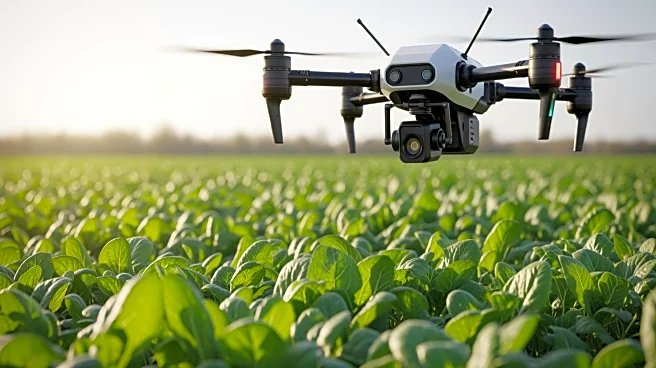What's Happening?
The agricultural sector is undergoing a significant transformation with the integration of artificial intelligence (AI) technologies. Innovations such as precision agriculture, which utilizes GPS, sensors,
drones, and data analytics, are optimizing crop and livestock management. These technologies help in efficient resource use, such as water and fertilizers, and improve animal health monitoring. Robotics and automation are also making strides, particularly in crop harvesting, where machines are replacing manual labor. AI-powered predictive tools are being developed to forecast disease outbreaks and pest infestations, allowing farmers to take preemptive actions. These advancements are expected to enhance supply chain efficiency by predicting market demand more accurately, thus coordinating food production and distribution effectively.
Why It's Important?
The integration of AI in agriculture is crucial for boosting productivity and sustainability in the sector. As the global population continues to grow, the demand for food increases, necessitating more efficient farming practices. AI technologies can help meet this demand by improving yield and reducing resource wastage. The use of AI in agriculture also addresses labor shortages by automating tasks that were traditionally labor-intensive. Furthermore, AI-driven precision irrigation systems can help conserve water, a critical resource in the face of climate change. The adoption of these technologies can lead to a more resilient agricultural sector, capable of withstanding environmental and economic challenges.
What's Next?
As AI technologies continue to develop, their adoption in agriculture is expected to increase. Farms of the future will likely rely more on AI for decision-making processes, from planting to food delivery. The rise of controlled environment agriculture, such as indoor vertical farms, is anticipated, with facilities like Fischer Farms in Norfolk leading the way. By 2030, a significant majority of farms are expected to use satellite monitoring and AI-based decision support systems. This shift towards tech-enabled farming will require investment in infrastructure and training for farmers to effectively utilize these new tools.
Beyond the Headlines
The integration of AI in agriculture not only promises increased productivity but also has the potential to transform local communities. By enabling more localized and precise farming practices, AI can help regenerate land and reduce the overuse of chemicals. This can lead to more sustainable farming practices and improved food self-sufficiency for local communities. Additionally, the growth of local agri-tech hubs and urban vertical farms can create new job opportunities and bring fresh produce closer to consumers, enhancing food security and economic resilience.











